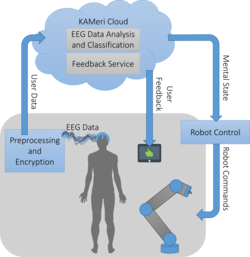KAMeri
Cognitive Occupational Safety for Human-Machine Interaction

The project KAMeri focuses on the improvement of occupational safety in a working context by analysing brainwaves and adapting human-maschine interaction according to the worker’s cognitive state. An new easy-to-use EEG-headset is developed to capture brainwaves. The brainwaves are analysed to detect safety-relevant kognitive states like e.g. fatique and adjust the robot’s behavior.
Project details
With a new, innovative approach, this research project aims to make a crucial contribution to improving occupational health and safety and working conditions in environments characterised with close human-robot interaction.
The first goal of the project is to measure the cognitive state, for example the stress level or the concentration ability of the workers and thus to optimize the interaction with robots and machines in real time with regard to increased safety.
The cognitive states will be measured by brain-computer interfaces integrated in headsets, which permanently record brainwaves via EEG and are evaluated using modern analysis methods. The information obtained in this way is used to adapt the work processes to be performed. For example, if the worker's attention decreases, the robot involved in the process should automatically slow down the speed.
In this way, the second objective can be achieved: a reduction in the number of accidents at work that occur when humans and robots work together, and a promotion of the physical and mental health of employees. From a technological point of view, the research project is intended to enable a new form of human-machine interaction in production that will make cooperation between humans and robots more intuitive, efficient and ergonomic.

